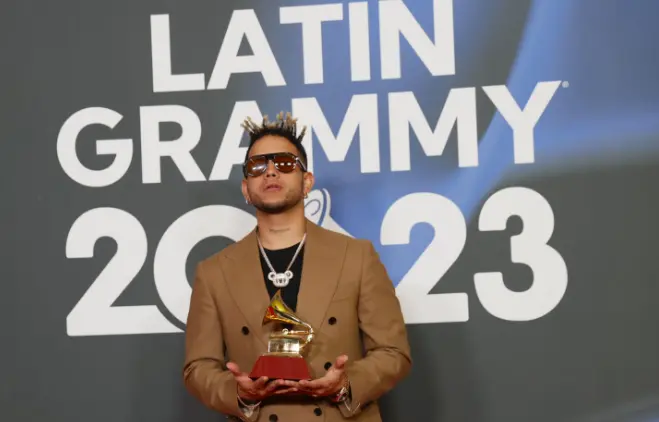The 24th edition of the Latin Grammy Awards, the first to be held in Spain, has crowned a group of kings and queens made up of the Mexican-American Edgar Barrera, the Argentinean Bizarrap, the Mexican Natalia Lafourcade and the Colombian Shakira and Karol G in a gala that was especially powerful for their country.




In “the most important night of Latin music”, held this time far away from the U.S., in the Palacio de Congresos y Exposiciones de Sevilla, it was premonitory that the list of winners was inaugurated by Barrera as composer of the year, a new category that “opens space for those who compose songs but do not sing them and who usually go unnoticed”, as he claimed.
This artist of Mexican origin was the main candidate from the start with his 13 nominations, of which he has ended up materializing also those of producer of the year and best regional Mexican song as co-author of ‘x100to’, all of them in the ceremony prior to the televised gala.
A strong night for women.
The night has not gone badly for Natalia Lafourcade, winner of the Latin Grammy for recording of the year for ‘De todas las flores’ and best album and best singer-songwriter song. Lafourcade has celebrated “the medicinal power” of music after acknowledging that this was “the most personal album” of her career, at a time when she was “all broken”.
“I can’t believe that this year the best urban music album is by a woman”, exclaimed Karol G when she received this distinction for her ‘Mañana será bonito’, which had yet to win the Latin Grammy for album of the year. Off-camera, she also received the award for best urban fusion/performance for ‘TQG’ with Shakira, who has experienced a night as strong musically as her last year has been.
Much of that success has come from her artistic partnership with Argentine DJ and producer Bizarrap with ‘Bzrp Music Sessions, Vol. 53’, which the Colombian used to catalyze frustration over the infidelity and end of her relationship with soccer player Gerard Pique.
“To my children I have promised that I will be happy,” said the artist, who has won the awards for song of the year and best pop song with Bizarrap and dedicate it to the little Sasha and Milan. These have accompanied her in the audience during the ceremony and even in his performance, to debut through a video as little singers.
They were not the only Colombians who have made even more overwhelming the current moment of the music of their country. Juanes won the best pop/rock album for ‘Vida cotidiana’, Camilo the best full-length music video for ‘El primer tour de mi vida’ and Carlos Vives the cumbia or vallenato album for ‘Escalona nunca se había grabado así’.
To the list can still be added others such as Andrés Cepeda (best traditional vocal pop album for ‘Décimo cuarto’); Monsieur Periné (best alternative music album for ‘Bolero Apocaplíptico’) and Juan Galiano (member of Diamante Eléctrico, for the best rock song, ‘Leche de tigre’).
Meanwhile, Spain’s Quevedo and Argentina’s Bizarrap won the award for best urban song as composers of their famous ‘Bzrp Music Sessions, Vol. 52’, which already achieved the feat of staying for seven weeks at number 1 globally on Spotify.
The Argentine producer and DJ, who started this whole adventure “in his room with a computer”, has then cited “to all the boys and girls who are starting, to see that with very little you can achieve a lot”, while his canary ally wanted to thank the public “for taking the song to where they took it” and making them “an example that you can get out of nothing”.
A ceremony with an Andalusian flavor.
That this was the first edition based in Spain and outside the U.S. has been felt in numerous winks as the giant fans on stage or the flamenco number that, between red lights and a touch of hammer and anvil, have starred in the early stages of the evening artists like Israel Fernandez and Niña Pastori, winner of the best album in this category.
The Spanish flavor has been felt even more at the beginning of the televised broadcast, first with the delicate version with flamenco quejío that Rosalía has made of ‘Se nos rompió el amor’ popularized by her compatriot Rocío Jurado and, just after, with the recovery of ‘Corazón partío’, that Alejandro Sanz has done surrounded by a large corps de ballet between Manila shawls and fans.
Also Antonio Banderas, who has been awarded the 2023 Presidency Award for his support to the arts and, specifically, to music, wanted to praise the change of venue in this edition to Andalusia, “fertile land” in creators such as Federico García Lorca or Rafael Alberti.
The gala had other notable moments such as the performance of the Puerto Rican Rauw Alejandro, generous on stage even with a version of ‘Se fue’ of the Person of the Year 2023, Laura Pausini, but very elusive among the press in front of personal questions before the first date in which he has shared a roof with Rosalía since their breakup.

